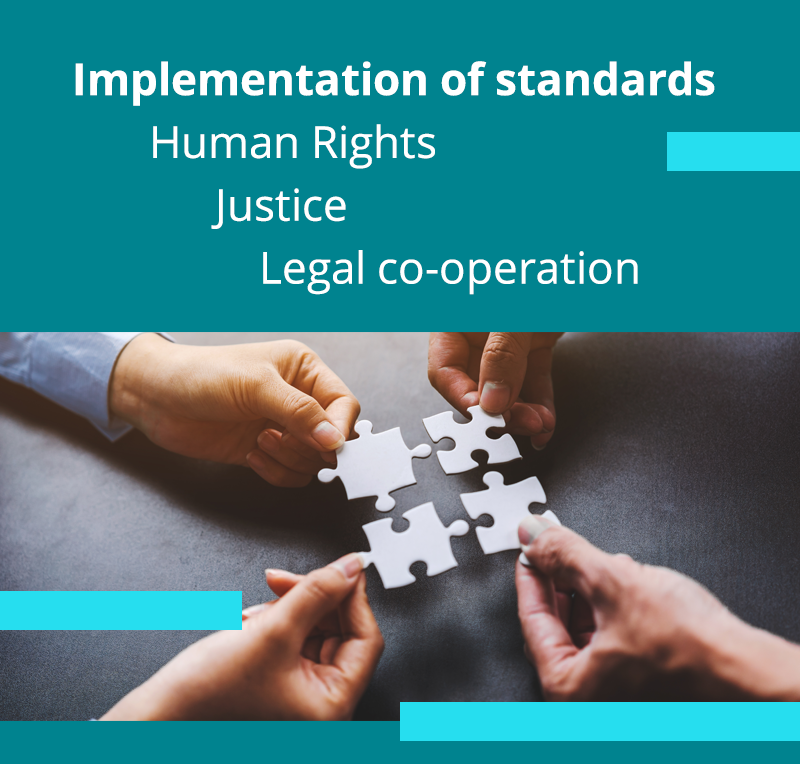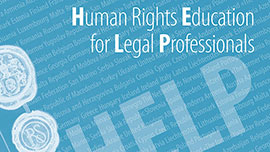Immediate measures package for Ukraine - PIMU
The project was developed and implemented to address legislative and institutional challenges in the areas of human rights, the rule of law and democratic governance which Ukraine faces, and which are not directly covered by ongoing Action Plans and cooperation agreements.
Particularly the project contributed to the effectiveness of the investigations from a human rights perspective following the Maidan demonstrations at the end 2013, early 2014 in Ukraine.
Outputs and results
Component 1.1 Effective investigations
The following outputs and results were achieved:
- support to the International Advisory Panel[1] was provided,
- the development of the National Human Rights Strategy (NHRS) for Ukraine and its Action Plan has been advanced via the provision of CoE comments and recommendations on the draft document which have been discussed together with the representatives of the national authorities (the national partners in the co-operation on the NHRS were notably, the Ministry of Justice and Ministry of Foreign Affairs, Verkhovna Rada, the Office of the President of Ukraine, the Ukrainian Parliament Commissioner for Human Rights (the Ombudsman)) and the international community.
- expert support was provided on investigation standards and techniques by training investigators on investigation requirements, thereby ensuring the application of the ECHR.
- sustainable capacity-development for legal professionals (and especially lawyers who defend the interests of victims) was developed with the aim to improve the response to human rights violations through training in human rights standards. The training courses were implemented by the National School of Judges and National Academy of Prosecutors.
- staff at the Ombudsperson’s office has been enabled to better prevent human rights violations through training on their monitoring and reporting skills, in accordance with the CPT standards. Technical support has also been provided with the equipment of technical measuring of detention conditions.
- relevant staff at the General Prosecutor’s Office and the Government Agent of Ukraine improved their understanding of investigation obligations under the ECHR.
- support has also been provided to the rehabilitation of victims by helping local NGOs to develop and to maintain a monitoring system and to conduct advocacy work supporting victims of human rights violations in rightfully claiming medical and social assistance.
Component 2.2 On Legislative Reform concerning Public Assemblies
The following outputs and results were achieved:
- a new impetus was given to the reform of the public assembly legislation; representatives from relevant ministries, the Government Agent’s Office, other state bodies, members of parliament and representatives of civil society furthered the discussion on legislation needs and gained a better understanding of requirements under the ECHR;
- judges increased their knowledge and skills to consider the ECHR in cases relating to assembly and association and a corresponding handbook with reference to the ECtHR case law was developed;
- through training that focused on the prohibition of excessive use of force and other aspects raised by the ECtHR, police officials learned about management methodologies for keeping public events peaceful by integrating the operations prior to the event and outlining correct behaviour of/for the forces involved. The main learning outcome was how to reconcile strict adherence to human rights with maximum safety conditions for all actors of the event.
[1] International Advisory Panel (IAP) was set up by the Secretary General (SG) of the Council of Europe, to ensure that investigations of violent incidents surrounding the Maiden demonstrations meet all the requirements of the European Convention on Human Rights (ECHR) and the case law of the European Court of Human Rights (ECtHR). In September 2014, the Panel’s mandate was extended also to the investigations into violent incidents in Odessa on 2 May 2014. In 2014, the IAP held three working sessions in Strasbourg and five in Kyiv, and the Chair of the IAP visited Ukraine and held meetings with national stakeholders to secure co-operation. The IAP examined the information about the Maidan-related investigations, which were submitted by the authorities and human rights groups. On 15 April 2015, he presented the final report on the Maidan related investigations. The report was made public on 31 March 2015.
Project information
- Duration: 15 April 2014 – 31 December 2014
- Place/ country: Ukraine
- Budget: 700 000 € for the two components (2 700 000 € in total)
- Funding: Voluntary contribution of Denmark, Estonia, Finland, Germany, Ireland, Liechtenstein, Luxembourg, Romania, Sweden Switzerland, Japan




